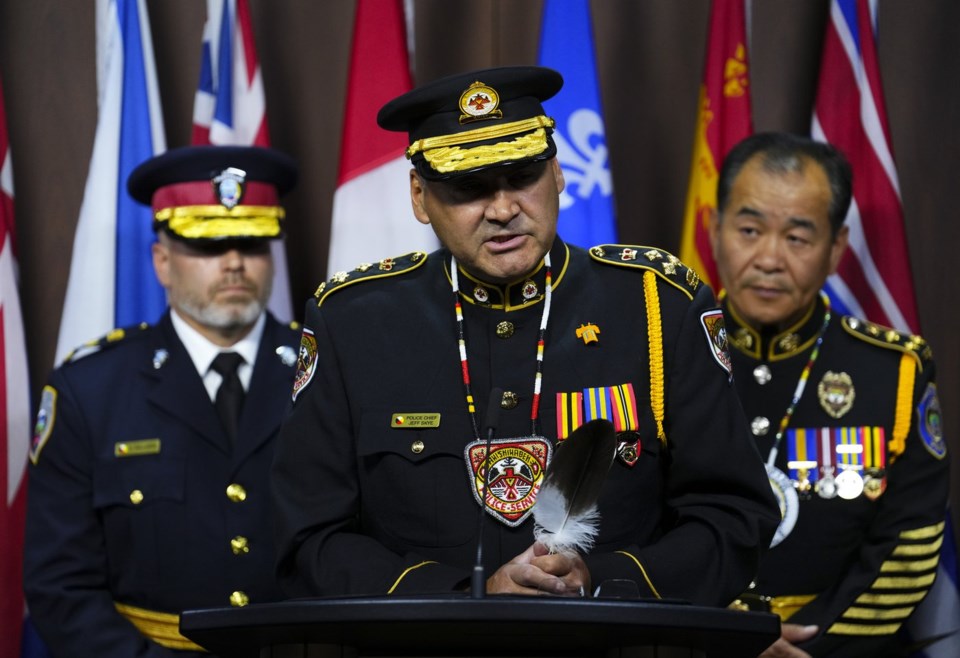TORONTO — A northern Ontario First Nation declared a state of emergency Tuesday over concurrent crises involving crime, gang activity, addiction and mental health problems that have plagued the community for years.
Netmizaaggamig Nishnaabeg First Nation has asked the province and the federal government for policing and mental health help, Chief Louis Kwissiwa said at a news conference at Queen's Park.
"Organized crime and drug trafficking has created an ever-growing crisis in our community," Kwissiwa said.
"Addiction, violence, and trauma is spreading. Overdoses are increasing. Mental health crises are pushing our resources to their breaking point."
The First Nation, about 350 kilometres north of Sault Ste. Marie, Ont., is $5 million in debt after trying for several years to fix the problems, the chief said. They've installed security cameras, bought licence plate readers and have brought in outside security on an emergency basis.
"Our call rate for emergency services is 35 times higher per capita than the city of Thunder Bay," Kwissiwa said.
Suicides, addictions and untreated mental health issues are on the rise in the community, he added.
"We cannot continue to shoulder this crisis alone," Kwissiwa said.
"We are calling on the federal and provincial governments, law enforcement agencies, and health services to act now."
The closest detox and treatment beds are a four-hour drive away in Sault Ste. Marie or Thunder Bay, Ont.
"Without immediate intervention, more lives will be lost, and the fabric of our community will continue to unravel," said Joe Moses, the CEO of the First Nation.
He said 64 of the community's 121 homes have some type of substance use occurring inside, a figure that has risen in recent years with predatory gangs lurking with drugs.
There are at least three such gangs within the community, Moses said. There have been violent home invasions, stabbings and human trafficking, he said.
Netmizaaggamig Nishnaabeg, with an on-reserve population around 400, must wait at least 45 minutes for police, fire or ambulance response in an emergency.
The First Nation has completed a proposal for the resources it needs for a community-based detox program, treatment and followup care.
"We just want to be heard and understood and have some partners come to the table and help us execute these plans," Kwissiwa said.
The nearby Anishinabek Police Services department has struggled with staffing and has only five officers available, Moses said. An Ontario Provincial Police detachment is supposed to backfill for Anishinabek Police Services, but the OPP is struggling with staffing, too, he said.
Sol Mamakwa, NDP deputy leader and the only First Nation representative in the Ontario legislature, brought the issue to question period Tuesday and asked if the province would help.
"This is a serious matter," said Solicitor General Michael Kerzner. "That’s why earlier this morning I spoke with Chief Jeff Skye of Anishinabek Police Services to discuss just how serious this is."
He said he told the federal government this summer that policing on First Nations must be revisited and that it must be made an essential service.
"When the federal government comes to the table and antes up more money to do the right thing, Ontario will do it as well," Kerzner said.
"This minister cannot use jurisdiction as an excuse to walk away from this issue," Mamakwa responded.
Federal Indigenous Services Minister Patty Hajdu has been in touch with Netmizaaggamig Nishnaabeg First Nation to find solutions, her office said.
"No one should ever feel unsafe in their home," said Jennifer Kozelj, Hajdu's spokeswoman.
"Whether Indigenous, or non-Indigenous, we are each other’s people and we have to come together in times of need."
This report by The Canadian Press was first published Nov. 19, 2024.
Liam Casey, The Canadian Press




